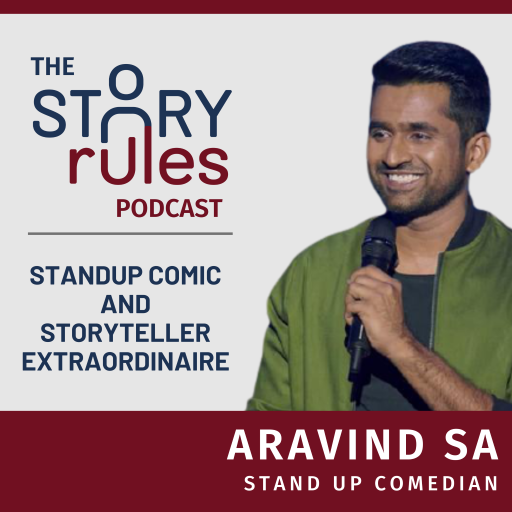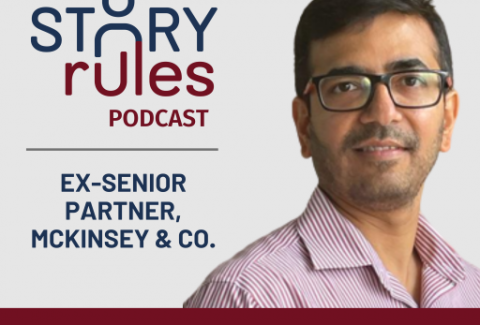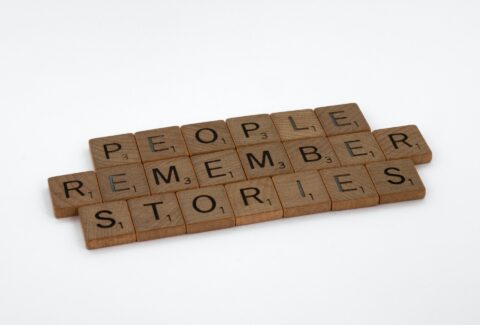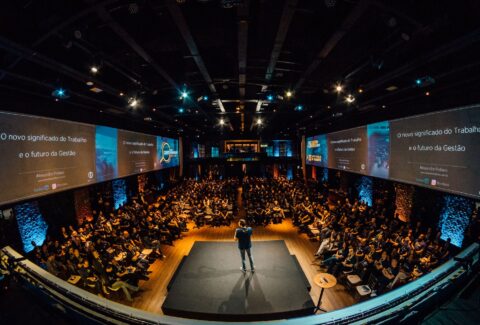E08: Aravind SA – Standup comedian and Storyteller extraordinaire
‘I don’t make jokes, I tell stories’
When I started the Story Rules podcast, I wanted to interview all types of storytellers. Among practitioners of this craft, I find standup comedians perhaps the most talented.
Let’s step back and acknowledge the sheer craziness of their mission:
– Just one person
– Entertaining hundreds of people at a time
– Holding their attention at high levels of energy
– For more than an hour
– Armed with nothing else but some content and a mic.
Standup comedy is a serious skill.
Aravind SA (aka SA) is among the foremost standup comics in India. You may have come across his work because of the viral video of why Tamilians hate the song ‘Lungi Dance’. Or you may have seen his Amazon Prime specials “Madrasi Da” or “I was not Ready Da’.
I had attended a show by SA in Pune many years back. I vividly remember one statement he made. I’m paraphrasing here, but he said – “I don’t make jokes, I tell stories.”
When I started the Story Rules podcast, SA was the kind of storyteller that I wanted to talk to. And so this was kind of a dream come true.
(Many thanks to SA and his team – especially Swetha from OML for making this happen).
An honest, no holds barred conversation
In his shows, SA takes real-life incidents that he’s undergone, many of them traumatic… writes them down after extracting every drop of humour from them and then proceeds to perform them with his manic, infectious energy.
But more than his funny bone and intensity, what struck me was his deep, unabashed honesty. SA presents his full authentic self to you, warts and all.
For instance, he talks about his deep-seated need for attention – which makes him want to perform… coupled with his paradoxical fear of public speaking (which means he practices his routines obsessively).
He also opens up about mental health and how he copes with Attention Deficit Disorder.
This episode is a fascinating deep dive into the mind of an artist who’s as driven as he’s talented… and who’s fearlessly pushing the boundaries in his profession.
As always, I’m sharing some some lightly-edited extracts from the conversation – tagged under ‘the 3Ps’ – the Personal, Philosophical and the Practical.
(All emphasis mine):
1. Personal:
Looking at SA on stage, you would probably think – ‘hm, this guy must have been a theatre/debating performer at school. So much confidence’.
Here’s SA: “I’m not comfortable speaking in public at all, to date. I can’t do it. I mean if I have to do it, I’ll have to go and rehearse like a maniac.”
Ravi: “You were not one of those ‘debate guys’ in school and stuff”
SA: “Never. I would not even get on stage to talk. I would really be afraid.”
Ravi: “It must have taken you so much courage SA, to actually do your initial sets when crowds may not have known you, and people are not looking at you, they’re eating and…”
SA: “Well, it helps to have (a) a therapist who thinks this is the best thing that could happen to you for your nervy nature, for your ranting, angsty, nature, etc. Because that, when we were contemplating stand-up comedy, it’s not like she knew what it was. We both googled it together when I said, looks like there’s something like this happening. And they’re asking me to give it a go. And (b), it also helps you have your best friend who started the stand-up comedy movement in Chennai, and his name is Bhargav/Baggy…”
Sometimes artists don’t realise how good they are – they need others who have a keen eye to spot their talent and guide them to the right stage.
Luckily for SA, his best friend, Bhargav (aka Baggy) turned out to be that person. Bhargav, apart from being a standup comedian, was one of the founders of Evam Standup Tamasha, a collective which pioneered standup comedy in Chennai.
SA describes a fascinating scene on the sands of the Besant Nagar beach in Chennai:
“One day 10 years ago, when I called all my close friends to Besant Nagar beach in Chennai, and I was telling them one of my love stories. We caught up after ages, then I had to put them up to speed with six months of a one-side love story that was happening my life. And I sat them down and I stood facing the beach and on the other side.
I was just telling them the story about what happened, hey this happened, that happened, I told this and she didn’t care. I tried this she wouldn’t care but then my ego grew blah, blah, blah. And then, Bhargav basically pointed out at, around 20 minutes later he asked me to stop and he asked me to look behind me. There were, apart from the 5 of us, there was a group of 20 sitting around us, listening.
And I didn’t realize because I was so emotionally engrossed in that I didn’t realize shit, I was just like, I gave all my personal life story, not to just 4 of my closest friends. And people around have also come in and it became a thing where they were laughing and they were like ‘yaaru da inda paiyan?’ Who’s this kid? Why is he so full of energy and at the same time, like a crazy range of emotions from sadness to happiness”
And then SA continues:
“So that is what led to Bhargav actually cheating me into auditioning for the company. He cheated. He literally told me “come to the office, I have an emergency. I need your help here.” And the minute I came there, he was like, “Okay, buddy, there is no emergency.” I saw the finest of talents of Chennai there with the paper in their hand. And he’s like “there’s no emergency”, locked the door and he said “you’ve come to the audition for the stand-up comedy that we are starting in Chennai. And there’s no, there’s no running now. Remember the story you told in Besant Nagar beach a few days ago, just do the same thing.” And I was like, I said, “Bro, are you kidding me?” and He’s like No, you have to blah blah, blah. And I remember saying I said “I can’t, I don’t like being judged. I can’t do this. They will judge me. My English is not good, my accent is bad”, blah, blah, blah, everything. All the worst demons came out and then “he was like it’s okay, I’m here. It’s okay, I’m here”. So that, then the audition happened and I killed the audition. Simply because I was the only one who’s not prepared. I was raw.”
And some more:
“I think I made it in life as a stand-up comedian only because of the fact that in my first three-four years of that impressionable period, I had my best friend, I was part of that company who was trying to start a stand-up comedy movement in Chennai, and my best friend was leading the movement there. And therefore, for every setback, quitting was just not an option simply because he’s there to put an arm around my shoulder and say, “Hey, you got this? It’s okay. No, it’s not the end of the world.”… because I had so many bad shows. There have been times where, in the middle of a show, I put the mic and I walked off to the side of the stage, where he’s standing, to tell him, “I told you, I don’t want to do this.” And the audience is still waiting like, “Why’s this guy in the middle of the performance leaving.” And I was like, why should I give them something, they are not even laughing or not even caring about who’s performing, etc. And then he’ll push me back saying “just go, we’ll talk and we’ll analyze and we’ll do all that later.” The kind of energy and bandwidth he had to handle the drama, an angsty person like me, and that’s why we got along from school because he has that kind of temperament.”
More power to Baggy (and his ilk) – for seeing the raw potential in SA and gently, untiringly encouraging him to conquer his fears and share his talent with the world.
2. The Philosophical:
SA believes in being authentic and embracing your fears – and putting them out in the open.
SA: “The tip I give any aspiring public speaker is just whatever your fears are, tell them that. Put it out there. If you’re thinking “Oh my god I’m gonna have a disaster tonight and I can’t believe all your faces are looking extremely ugly and it’s making me even more anxious”, tell them that. Yes, it’ll take them a minute or two to process and be shocked, but then the brutal honesty of the connection that you’re doing there will take you with them for the rest of the piece, once you do that leap of faith. You have to take the risk and that jump”
Another philosophy SA uses to conquer his fears: Preparation. I found this conversation extract fascinating:
Ravi: “…in your case, there is this interesting paradox…. that you love that attention that you get, you want that attention, but at the same time you have fear – which a lot of people have – of public speaking. And so to combine these two that, okay, I want the attention, but no, I don’t want to be in front of so many people talking. (I guess what helps is) having that process, and, as part of the process, it’s writing down, it’s a lot of preparation…
SA: “It’s writing down, it’s reading out, it’s multiple feedback loops through focus groups that I would end up creating. So it is activating muscle memory every time. So then when you go to the stage, that’s not the first time you’re doing it, I am, because I have a very bad memory, so I can’t retain the line. So I really have to do it four times on that day before I go. So I have friends individually come up to me, I’ll book their times in advance saying I need 45 minutes of your time one-on-one. Come, I’ll do a video call and I will do the lines. Without assisted by a script.”
Ravi: “So I read that, ‘stage time is best’. And you’ve mentioned this yourself, ‘stage time is the best time’. So I would assume that people try out or do these kinds of rehearsals in open mics. But you’re saying even the open mics need to be your best performance.”
SA: “I have to do it because I am not confident. I don’t back myself to date to just be able to go to the open mic and use it. For me for that stage time to actually do me good, I have to do this much level of back work for me to get there to do that open mic to eight people. Because at the end of the day, it’s also because it comes from my nature, I can’t do a half-assed job of anything.”
3. The Practical
Here’s one practical tip when presenting a deck at work: Use segues between slides.
Here’s how this part of the conversation went:
Ravi: “I love your ideas of doing segues, and it might be just a very small one-liner, but you make sure it’s there. For example, in ‘I was Not Ready Da’, somewhere in the beginning, you say “And this is dedicated to my mother”, and then immediately you segue to ask “How many of you have brought your mothers to the show?”, and then you pick and catch some people.
Even the horoscope joke, you kind of finished it and you said “Okay, horoscope didn’t match”, and then add “nowadays everybody matches on Tinder”, and then you go on to the riff on Tinder.
This – just that word match, connecting (between segments)… that’s something that I teach to people that when you’re moving from one slide to the other slide you’re actually moving between almost two segments you need to have something to do that connects. Again is that something that you do consciously?”
SA: “Yes, because I feel it comes from my innate insecurity that I don’t want to lose you. So, if there is a potential of me losing you, because if I would assume every audience member to be as judgmental about every line and to be as micro-analyzing it like me.”
Perhaps we all should be as considerate (and paranoid) about our audience’s attention as SA is.
Towards the end of the conversation, SA pondered over what is the most important ingredient for a standup storyteller. (It was not being the funniest guy in the group)
SA: “At the end of the day, I felt, it’s the need to be heard, that I feel is so unnoticed and I feel that it’s so beautiful and that is that I feel, is be the principal mantra for storytelling, because you need to have that, then you will be whoever that means if you’re a stand-up comedian or a filmmaker or a motivational speaker.
And for that, I think empathy is a big thing, but the need is what will drive it… (The) funniest guy in my group never cared two hoots about wanting to do something about it. … I did want to be funny, but I was not good at it, but to date I’m able to acknowledge the fact that … had I got all the validation that time I would have never been here right? So… Long may this last.”
Long may the magic of SA last.
Three things that stayed with me from the conversation:
1. Be Authentic: Own your true self – the audience would rather see a flawed genuine person rather than a perfect phony.
2. Share your fears: Sunlight is the best disinfectant. Putting your fears out in the open will make them shrivel and die.
3. Prepare well: When in doubt, practice. SA’s dedication to his process even for open mics tells us – no stage is too small to prepare well.
You can enjoy my conversation with SA at your favourite podcast location:
Browser
Podcast apps: Apple Podcasts | Spotify | Google Podcasts | Stitcher | Podcast Addict | Pocket Casts
Happy listening!
If you find this content valuable, please rate and review this podcast on iTunes, Spotify, Google Podcasts, or wherever you listen to them (links above). It’ll help others like you discover these insights!
This podcast episode was hosted by me, Ravishankar Iyer. Transcript editing by Sanket Aalegaonkar. Audio editing by Kartik Rajan.
Thanks
Ravi








